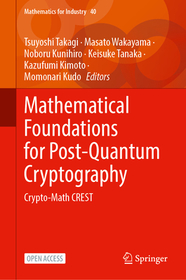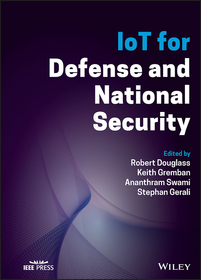
Mathematical Foundations for Post-Quantum Cryptography
Crypto-Math CREST
Series: Mathematics for Industry; 40;
- Publisher's listprice EUR 53.49
-
22 184 Ft (21 128 Ft + 5% VAT)
The price is estimated because at the time of ordering we do not know what conversion rates will apply to HUF / product currency when the book arrives. In case HUF is weaker, the price increases slightly, in case HUF is stronger, the price goes lower slightly.
- Discount 12% (cc. 2 662 Ft off)
- Discounted price 19 522 Ft (18 593 Ft + 5% VAT)
Subcribe now and take benefit of a favourable price.
Subscribe
22 184 Ft

Availability
Not yet published.
Why don't you give exact delivery time?
Delivery time is estimated on our previous experiences. We give estimations only, because we order from outside Hungary, and the delivery time mainly depends on how quickly the publisher supplies the book. Faster or slower deliveries both happen, but we do our best to supply as quickly as possible.
Product details:
- Publisher Springer Nature Singapore
- Date of Publication 28 November 2025
- Number of Volumes 1 pieces, Book
- ISBN 9789819612178
- Binding Hardback
- No. of pages496 pages
- Size 235x155 mm
- Language English
- Illustrations IX, 496 p. 46 illus., 25 illus. in color. Illustrations, black & white 700
Categories
Long description:
This open access book presents mathematical foundations for cryptography securely used in the era of quantum computers.
In particular, this book aims to deepen the basic mathematics of post-quantum cryptography, model the strongest possible attacks such as side-channel attacks, and construct cryptographic protocols that guarantee security against such attacks.
This book is a sequel of the successful book entitled by ``Mathematical Modeling for Next-Generation Cryptography - CREST Crypto-Math Project'' which was published in 2018.
The book is suitable for use in an advanced graduate course in mathematical cryptography and as a reference book for experts.
MoreTable of Contents:
1. Algebraic Geometry.- 2. Number Theory.- 3. Theory of Computation.- 4. Quantum Computation.- 5. Quantum Field Theory.- 6. Mathematical Physics.- 7. Representation Theory.- 8. Lattice Theory.- 9. Multivariate Polynomial Theory.- 10. Data Encryption.- 11. Digital Signature.- 12. Searchable Encryption.- 13. Obfuscation.- 14. Privacy Protection.- 15. Copyright Protection.- 16. ID-based Encryption.
More









